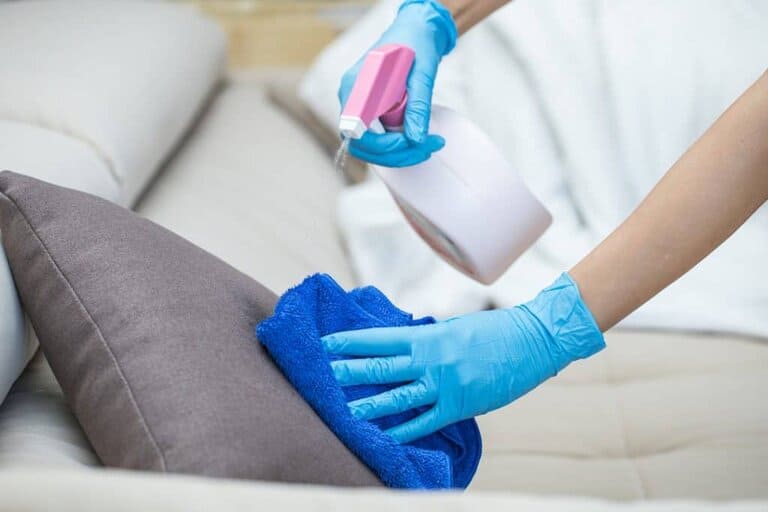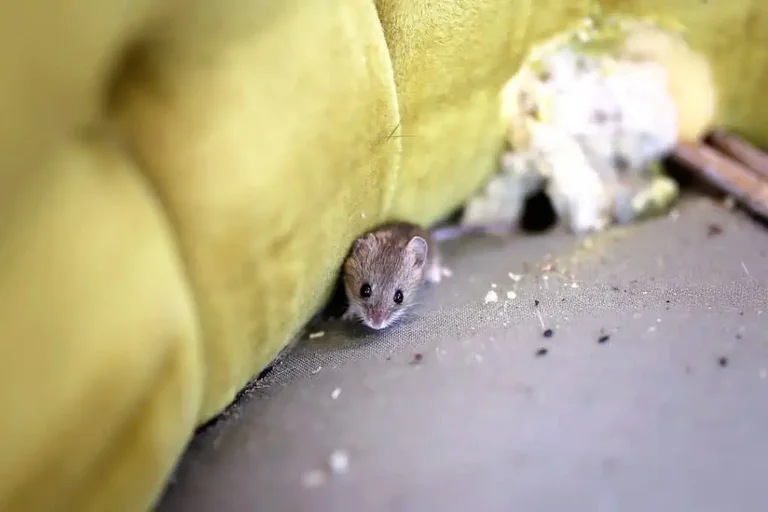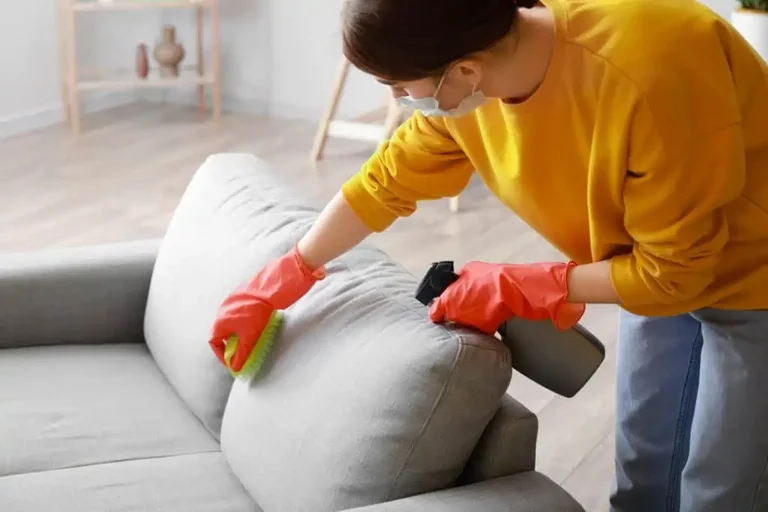The best way to clean a couch after mice is to spray disinfectant over all the affected areas and then wipe with a paper towel or a cloth. It’s vital to use gloves and a mask to minimize your exposure to any pathogens.
Great news! You’ve managed to get rid of your mice problem and you no longer have to be scared about them scurrying all over your house. While the mice may have gone, your troubles aren’t over just yet as you need to worry about cleaning up after them.
Mice love dark small places to hide and one of those places may have been your couch. Unfortunately, this can be a very difficult area to clean as you’ll need to ensure that you remove all remnants of the mice, including their droppings.
That’s where we can help. We’ll look at why the clean-up process is so important and how you can easily do it.

Why Cleaning Up After Mice Is So Important
Mice are excellent carriers for diseases and like to mark their territories with their urine or their feces, both of which can cause unsanitary conditions for a human household.
Also, they love chewing through wires, fabrics, or furniture coverings. Having mice in your home makes you vulnerable to diseases such as hantavirus, salmonella, and lymphocytic choriomeningitis. These diseases can spread via contact with their urine, droppings, or saliva.
Any place frequently visited or nested by mice will be contaminated with these pathogens. However, when it comes to your couch, a mouse can leave behind more problems than just diseases spread by mice.
Fleas have historically spread fatal diseases among the human population and their favorite rides are urban mammals such as cats, dogs, and mice.
If the couch you are using has a hollow cavity underneath, on the sides, or between the couch pillows, there is a chance that the mice have at some point nested in them.
If your couch is giving off a repulsive smell, it is a confirmation of a mouse leaving urine, droppings, or there is even a dead mouse inside the couch. In such situations, your couch is a huge health hazard to your home and family.
The problem is not going to magically go away and therefore you need to tackle it head-on. You may want to call in a professional cleaning company but for many of us, that’s an expense we can’t afford so this is how to clean a couch after mice.

Preparations for Cleaning
Because humans acquire diseases spread by mice by coming in contact with their feces or urine, you should take the following precautions before you begin.
Necessary gear
You should wear gloves and protective clothing to keep yourself safe from infections acquired through contact with skin. In addition to this, the use of masks or cloth to cover your mouth and nose is also important.
If you don’t have any protective clothing, then just ensure that whatever you’re wearing is immediately washed after you’ve finished cleaning.
Mice nests and droppings release the disease-causing pathogens into the air, inhaling the air around the contaminated area will infect you with the diseases.
Furthermore, although not always necessary, wearing glasses or goggles can be a good idea if the mouse infestation was severe.
No more mice
It is useless to start cleaning while mice are still present, even if you clean up the entire house, they will simply come back and mark their territories once again.
According to the Center for Disease Control (CDC), you should set the mousetraps for at least a week before you begin your clean-up.
This is a surefire way to ascertain that there are no more mice left in your house. After a week, make sure to plug up any holes, openings, or cracks that lead into your households to prevent future infestations.
Gutters and drainage pipes should also be properly covered with sieves small enough to prevent insects and mice from getting through. Mice love to hang out in the attics, make sure to check for mice in attic and spaces between walls if you have hollow walls for insulation.
Cleaning Up After Mice
Once there are no more mice in your house, you can start the cleaning process. You have to clean up every place the mouse may have visited or stayed at during the time it was in your house.
If you were lucky enough to catch the mouse early, you might not need to clean much. However, in case the infestation has gone unnoticed for some time, you will need to clean it thoroughly.
Cleaning the droppings
Handling mouse droppings sounds disgusting and rightly so. Mouse droppings are full of harmful pathogens that can spoil your food, make you sick, attract other harmful insects, and ruin your house’s furniture.
Before you go near the droppings, be sure to put on your cleaning gloves. Using latex or rubber gloves is ideal since they are easy to clean (or dispose of) afterward.
Do not touch the droppings directly and use a mask or cloth to cover your mouth and nose when disposing of them.
The mask is necessary not just to protect you from the stench but also to keep you safe from the airborne bacteria and viruses that originate in the droppings. Do not leave the droppings in an uncovered trashcan, as that can still spread the viruses.
Before you wipe them up, it’s best to disinfect them first. Spray the feces with a disinfectant that kills all disease-causing microscopic beings in the droppings.
You can use a commercially available disinfectant however, you can mix one part bleach in nine parts water for an effective homemade disinfectant.
Getting rid of the urine smell
Mice mark their territories with their urine, while it may not bother them, the urine’s stench is disgusting. Luckily, the disinfectant solution that works on the droppings also neutralizes the urine smell and kills all the harmful parts of the urine.
Spray the affected area with the disinfectant or bleach solution and let it soak for 5 minutes. Afterward, just wipe the affected areas with paper towels.
After you’ve cleaned
After cleaning the droppings and urine, make sure to wash your hands, dispose of the trash properly, and wash your clothes with disinfectant detergents.
You are at an equal risk of getting sick from cleaning the mouse excretions as you are from a mouse bite. It is also recommended to open all windows to allow for ventilation. Finally, disinfect the gloves and cleaning gear you used to avoid acquiring infection from them.
How to Clean the Couch
The couch is one of the most important pieces of furniture in your living space. This sentiment is shared not only by your fellow humans but also by mice.
The fabric covers of a sofa are a treat to a mouse, if you see gnaw marks on them; it is a sign that mice once treated themselves to your couch.

The cavities in the couch are a mouse’s favorite spots, especially when it is dark. Mice are timid creatures and like enclosed dark places as it makes them feel secure. Therefore, a couch might give off a horrible stench after it has been infested with mice.
Luckily cleaning the couch is not that different from the rest of your house. Again, make sure you wear your protective gear when cleaning up after the mice.
Signs of a mouse infested couch
If there are mouse droppings found in your living area, there is a good chance that mice might have contaminated your furniture. The following signs can identify a mouse infested couch:
- The couch gives off a horrible smell similar to feces or urine
- There are gnaw marks or scratch marks on the furniture
- There are holes in the cambric (The fabric on the underside of the couch)
- There are holes in the walls or other parts of the couch
Accessing the couch
If the pillows or seat cushions of the couch are removable, it is better to take them and wash them separately with disinfectant detergents. Removing the cushions will let you see the inner side of the sofa where mice most likely were.
The evidence of a mouse’s presence will be their droppings and urine on the inner side of the couch. Some mice might even build a nest inside the couch, you will have to remove them carefully after spraying them with the disinfectant.
Mice might even chew through under the couch to make a nest inside the couch from the bottom. Flip the couch to check for any holes or signs of nesting underneath.
Exactly how to access the couch will depend on the particular model. For many couches, this will simply involve tipping it over and removing the cambric dust cover, which is often stapled but may have a zipped design.
Disinfecting and removal
Remember, everything related to the mouse’s nest can make you sick if you do not protect yourself properly.
Soak the inner part of the couch in disinfectant and leave it for 5 minutes. Use a paper towel to wipe away the droppings and urine stains from inside the couch and carefully remove the mouse nest and put it into an airtight bag.
If your area has sufficient sunlight during the day, you can leave the sofa or couch to sun-dry for a few hours to kill bacteria and get rid of the stench. If the couch has any removable fabric, take them off and wash them thoroughly to sterilize them.
Open the windows while cleaning the couch to ensure ventilation for clean air. Stain removal detergents can be used to remove fecal or urine stains from the couch and later dried.
Do not dust a mouse-contaminated couch, the dust particles coming off the couch can be dangerous to your health. This is also why you shouldn’t vacuum.
After wiping the couch, lightly spray the disinfectant for good measure and clean any surfaces that may have been exposed to the contaminants of the couch.
FAQs On How to Clean a Couch after Mice
Can I vacuum the couch after mice?
It is not recommended as this can throw mouse particles (and the diseases that come with them) into the air. If you do want to vacuum, make sure you have disinfected first.
How do I get rid of the dead mouse smell from the couch?
The bleach disinfectant solution (one-part bleach nine-part water) can help neutralize the smell from your couch.
How long does it take a dead mouse to start smelling?
A dead mouse starts to decompose in 12 hours and gives off a smell. It takes 2-3 days before the smell becomes strong enough for even the least sensitive noses to detect.
How long do mouse droppings remain infectious?
Hantavirus in the mouse droppings remains active for up to 2-3 days at room temperature. Other bacteria might survive longer than 2-3 days. Nevertheless, it is always best to spray the droppings with disinfectant before interacting with them.
